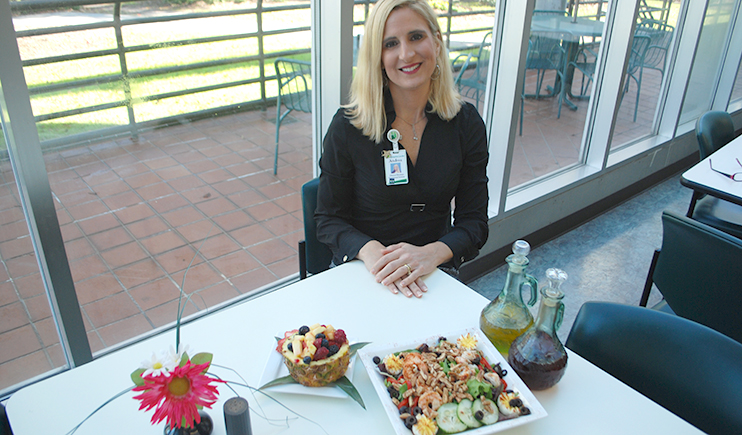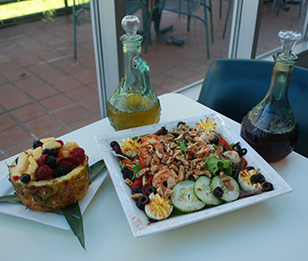Six foods to add, six foods to avoid in a heart-healthy diet
Nutrition, Heart Health
There are many factors that contribute to your heart’s health.
Some you can’t control – age, sex, family history, ethnicity. However, there are several things you can control, including diet and weight.
A healthy diet is vital in the fight against heart disease. Sure you eat fruits and vegetables, but there are other foods you can add to your diet to improve your heart’s health. Along the same lines, it may be time to eliminate bad products you are consuming.

We spoke with Dr. Michael Chisner, cardiologist and eletrophysiologist with Cardiology Associates of Savannah and the Advanced Heart Rhythm Center at St. Joseph’s/Candler, as well as St. Joseph’s Hospital Clinical Dietitian Andrea Manley to develop this list of six foods you should incorporate into your diet to improve heart health and six products to avoid.
Six Foods To Add
1. Oatmeal
Manley recommends starting your day off with oatmeal because it includes both soluble and insoluble fiber. Soluble fiber has been proven to lower your cholesterol, Manley says, because it helps clear your arteries of excess cholesterol on the artery walls. Insoluble fiber indirectly affects your heart because it keeps your GI tract healthy allowing healthy bacteria to live, which can help your heart, Manley says. Avoid sugary, flavored oatmeal and pick ground, steel-cut or rolled oats. You can add flavor with stevia, dried fruit or fresh fruit, Manley says.
2. Avocado, olive oil and other unsaturated fats
There are indeed some fats that are good for you. These are called unsaturated fats. Unsaturated fats are typically liquid at room temperature and contain at least one double bond (monounsaturated) or more (polyunsaturated). The American Heart Association recommends a total daily fat intake between 25 and 35 percent of calories with most fats coming from unsaturated fats. Examples of unsaturated fats that Manley suggests include avocado, olive oil, olives, nuts and certain fish, such as salmon. Dr. Chisner also recommends avocado, as well as blueberries and tomatoes.
3. Almonds and Walnuts
While nuts are a good source of unsaturated fat, not all are created equal. Manley recommends almonds and walnuts over peanuts because of the ratio of unsaturated to saturated fat, she says. She also encourages choosing almond or cashew milk over cow’s milk. In addition, she says nut butters are a better choice instead of dairy butters.
4. Fatty fish
Certain fish, such as salmon, tuna, mackerel and anchovy, are great sources of unsaturated fat and are additionally good for your heart because of omega-3. Omega-3 fatty acids are healthy fats that your body doesn’t make but needs to function properly. According to the American Heart Association, omega-3 can decrease the risk of arrhythmias, decrease triglyceride levels and lower blood pressure. Other foods that are good sources of omega-3 include walnuts, flaxseed and canola and soybean oils.
5. Lean meats
Manley recommends lean meats when considering protein sources. “Choose turkey bacon over bacon or ground turkey over beef,” Manley suggests. She also highly recommends baking or stir frying your protein sources rather than deep frying them. The reason you want to avoid fatty meats, such as bacon, sausage and some ground beefs, is because of the high amounts of saturated fat. Fat is a significant heart irritant, says Dr. Chisner, and can be a big factor in Atrial Fibrillation.

6. Whole grains
When it comes to grains, Manley says to choose whole grains, which are high in soluble and insoluble fiber. She recommends trying quinoa, millet, faro, barley, lentils and other whole grains that you might not think to include in your diet. She says to select whole grain rice and bread over white rice and bread, and pick up a sweet potato over a white one for added vitamin A and fiber.
Now that you know more of what you should be eating, here’s a look at six products that you should try to avoid and eventually eliminate.
Six Foods To Dump
1. Fried and fast foods
One of the best things you can do to improve not only your heart health, but overall health, is to avoid fried foods and fast-food restaurants, Manley says. “Stay away from fried foods because if you fry in lard, shortening or butter, all those things are very bad for the heart,” Manley says. Instead, she recommends a stir fry of healthy meats and vegetables in olive oil.
2. Some beef, pork and other fatty proteins
Manley recommends a plant-friendly diet with healthy protein sources such as salmon, lean chicken breasts, legumes and beans, and whole grains. The reason you want to try to avoid fatty protein sources, such as bacon, sausage, pork, fatty ground beef, lamb and poultry with skin, is because of the high amounts of saturated fats these foods contain. Saturated fats are fat molecules that have no double bonds because they are saturated with hydrogen molecules. Eating foods with saturated fats raises the level of cholesterol in your blood and increases your risk of stroke and heart disease. “Anything that is hard at room temperature is going to be saturated fat, and it will harden your arteries,” Manley says. “Anything liquid at room temperature is going to be unsaturated, and it’s going to help your blood flow better.”
3. Cheese and other high-fat dairy products
When it comes to dairy products, Manley recommends 1% or less for milk and cheeses and low-fat yogurts. “Cheese is very high in saturated fat so limit cheese as much as you can,” she says. Instead of dairy, try alternative products such as almond or cashew milk, nut butters and soy yogurts and cheeses. Manley warns that coconut milk isn’t the best substitute for cow’s milk despite its trendiness. Coconut milk is very high in saturated fat, Manley says, and should be consumed on a limited basis or by active athletes.
4. Sugar and high-fructose corn syrup
Sugar and high-fructose corn syrup are linked to increasing homocysteine levels, which is bad for the heart, Manley says. Homocysteine is an amino acid that is naturally found in the body. The higher your levels are the more at risk you are to coronary artery disease, stroke and peripheral vascular disease, according to the American Heart Association. Manley says to avoid sugary-foods (sweets, cereals and sweet breads) and especially sodas. “Read your labels and look for the all-natural products.”
5. Salt
Salt intake makes a difference in certain heart and medical conditions, Dr. Chisner says. People that eat too much salt are putting themselves at a greater risk for cardiovascular disease, especially as they age. Eating less salt can help lower your blood pressure or prevent it from getting too high in the first place. Salt is in the majority of the foods we consume, so Manley says do not add salt. If you want to add flavor to your food, Manley recommends cooking with spices and seasonings such as garlic or onion powder.
6. Alcohol
Alcohol consumption can lead to multiple heart conditions, including Atrial Fibrillation, stroke and cardiac arrest, says Dr. Chisner. Drinking large amounts of alcohol can increase the levels of some fats in the blood known as triglycerides and can lead to high blood pressure, according to the American Heart Association. The AHA recommends no more than two drinks per day for men and no more than one drink per day for non-pregnant women.
“Some of the best things people can do to help with heart health in general are lose weight, stop smoking and exercise regularly,” advises Dr. Chisner.
In the picture: A healthier version of a Cobb Salad

Skip the deli meats, bacon, cheese and ranch to make this salad more heart friendly
- Spring mix lettuce
- Walnuts
- Roasted red peppers
- Cucumber
- Olives
- Tomatoes
- Red onions
- Boiled eggs
- Lump crab meat
- Boiled shrimp
- Avocado
- Red wine vinegar and olive oil
Fruit cup: raspberries, blackberries, blueberries and pineapple